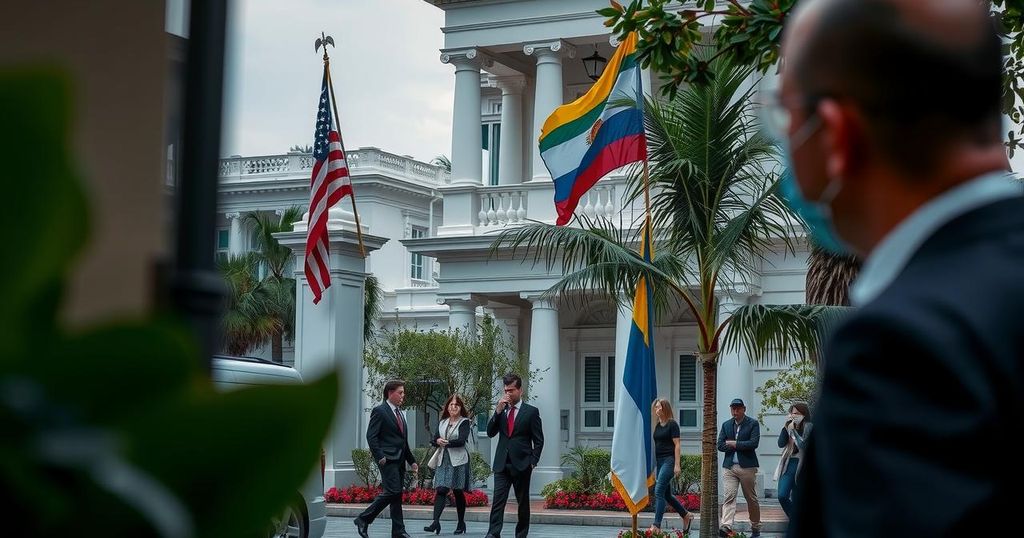Politics
ARGENTINA, BRAZIL, BUENOS AIRES, CABELLO, CARACAS, CORRUPTION, CUBA, DEMOCRACY, FOREIGN MINISTRY, HUMAN RIGHTS, LU, MARIA CORINA, MARIA CORINA MACHADO, NICOLÁS MADURO, NORTH AMERICA, PART, PARTIDO SOCIALISTA UNIDO DE VENEZUELA, POLITICAL PERSECUTION, SOUTH AMERICA, VENEZUELA, VIOLENCE
Isaac Bennett
0 Comments
Venezuela Refutes Argentina’s Accusations of Harassment Against Embassy
Venezuela’s Interior Minister Diosdado Cabello dismissed allegations from Argentina of besieging its Embassy in Caracas, amid claims of harassment related to asylum-seekers linked to opposition leader María Corina Machado. Tensions have escalated following these developments, with Brazil’s role in the diplomatic relations adding complexity to the situation.
In a recent press conference, Diosdado Cabello, Venezuela’s Interior Minister, firmly denied allegations made by the Argentine government that Venezuela is besieging its Embassy in Caracas. This denial comes in the wake of claims from President Javier Milei’s administration regarding a campaign of harassment directed towards the diplomatic premises. Cabello provocatively remarked on the nature of the accusations, asserting that this behavior stems from Milei’s leadership style he described as fascist, and urged clarity on the supposed harassment claims. The tense situation follows the refuge of several associates of opposition leader María Corina Machado within the Embassy, sparking further diplomatic tensions.
The Argentine Foreign Ministry issued a statement condemning what it termed as “acts of harassment and intimidation” against its asylum-seekers, insisting that Venezuela should provide the necessary safe passage for those individuals. The statement highlighted serious concerns about armed troops being deployed near the Embassy and the closure of surrounding streets, which they believe disrupts diplomatic security as mandated by international law. Additionally, Argentina’s government has voiced its concerns regarding power outages affecting the Embassy’s operations, to which Minister Cabello sarcastically remarked on the obligation of visitors to cover their utilities.
Cabello portrayed opposition leader María Corina Machado as a terrorist and expressed dissatisfaction at her escape from justice, particularly after she alleged electoral fraud in the recent presidential elections that resulted in Maduro’s re-election. The ongoing struggle has deeply polarized Venezuelan society, with international observers questioning the legitimacy of Maduro’s regime. Notably, Brazil earlier expressed its willingness to protect Argentina’s diplomatic presence in Venezuela but reversed its decision following a request from Caracas. This development adds another layer to the convoluted diplomatic landscape in South America.
Venezuela has been grappling with profound political strife, particularly surrounding the legitimacy of its electoral processes and persistent allegations of human rights violations. The recent presidential elections, which led to Nicolás Maduro’s continuation in power, have been met with skepticism both domestically and internationally. Opposition figures, including María Corina Machado, have sought refuge as threats against their safety escalate, leading Argentina to formally denounce Venezuela for its treatment of its diplomatic mission. As regional tensions rise, the international community’s response to the situation remains crucial.
In conclusion, Diosdado Cabello’s denial of harassment claims against the Argentine Embassy signifies the escalating diplomatic tensions between Venezuela and Argentina amid ongoing political discord. The accusations from both sides reveal the complex interplay of international relations in the region, particularly concerning the treatment of political asylum seekers and the responses from neighboring governments. The situation exemplifies the critical need for dialogue and adherence to international diplomatic norms.
Original Source: www.batimes.com.ar




Post Comment